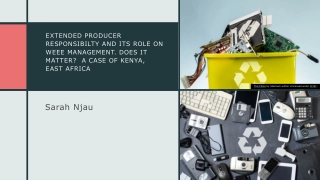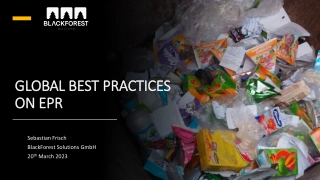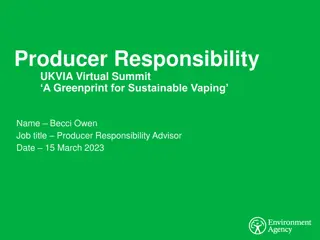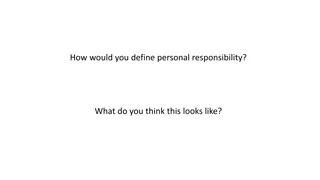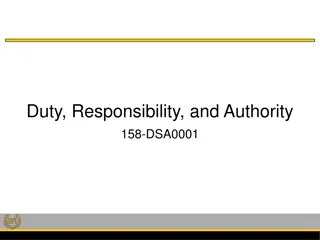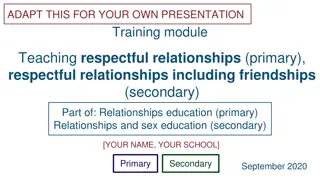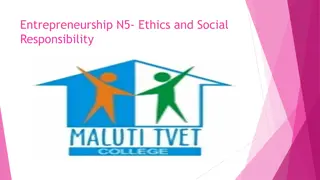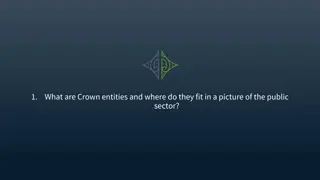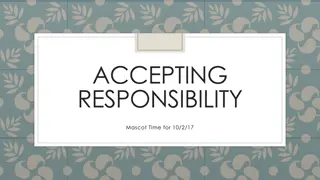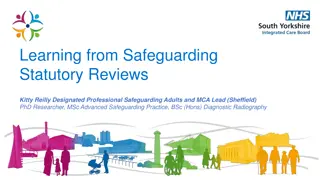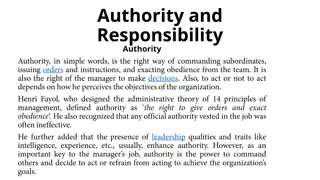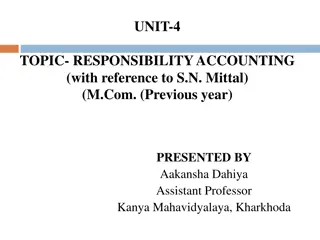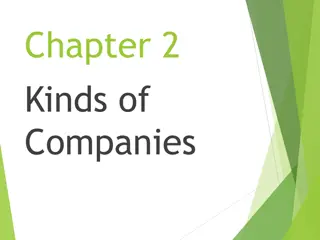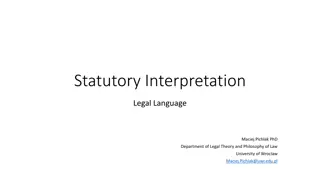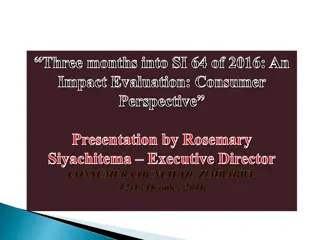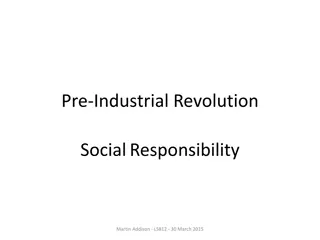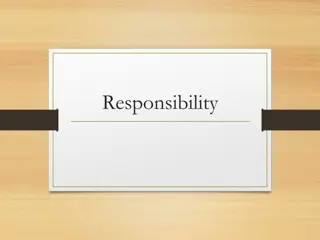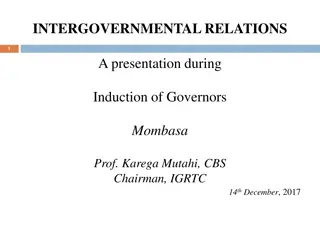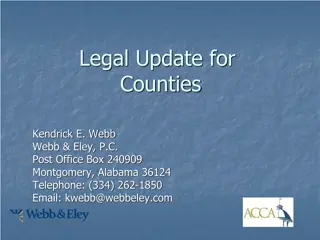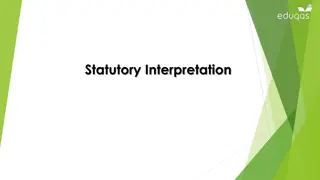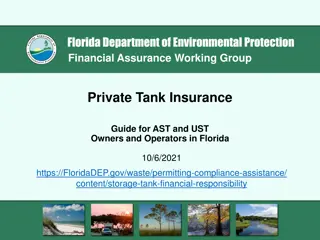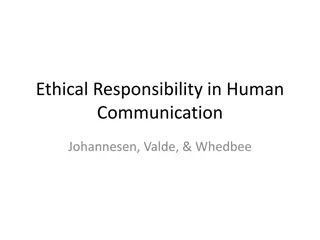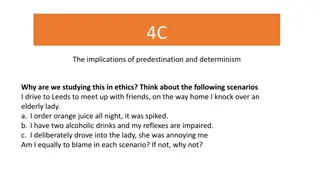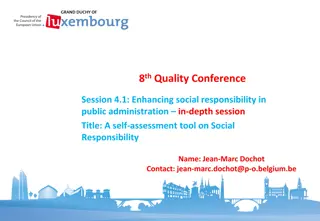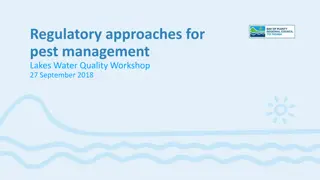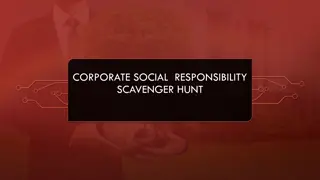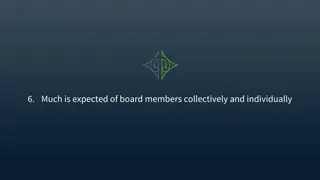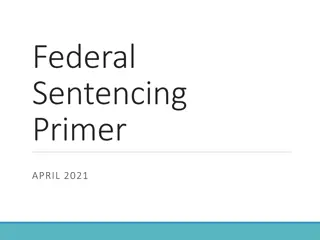The Impact of Extended Producer Responsibility on WEEE Management in Kenya
Extended Producer Responsibility (EPR) plays a crucial role in managing Waste Electrical and Electronic Equipment (WEEE) by shifting the responsibility of end-of-life product disposal to producers. In Kenya, proposed EPR categories cover a range of products from packaging to non-packaging items, aim
0 views • 9 slides
Understanding Extended Producer Responsibility (EPR) and Producer Responsibility Organizations (PRO)
This informative content delves into the concept of Extended Producer Responsibility (EPR) and the role of Producer Responsibility Organizations (PRO) in waste management. It covers EPR definitions, experiences from different EPR systems, and the setup flow among stakeholders. The discussion emphasi
2 views • 17 slides
Understanding Producer Responsibility in UK: Regulations for Sustainable Vaping
Producer Responsibility in the UK entails businesses taking accountability for the environmental impact of their products, including packaging, electrical equipment, batteries, and end-of-life vehicles. This responsibility extends to vapes as they fall under the Waste Electrical and Electronic Equip
0 views • 10 slides
Understanding Personal Responsibility
Personal responsibility is the state of being accountable and answerable for one's actions within their control. It involves valuing responsibilities over rights, respecting others, and striving to do one's best. Examples from clips show individuals taking responsibility for their actions, displayin
1 views • 11 slides
Love and Responsibility in Second Marriage Matrimony
Second marriages bring a unique blend of love and responsibility, offering a fresh start while building on past experiences. In second-marriage matrimony, individuals often find a deeper appreciation for companionship and mutual respect. Love is nurtured through shared understanding and the wisdom g
3 views • 1 slides
Understanding Duties, Responsibilities, and Authority in the Military
Explore the roles of noncommissioned officers (NCOs) in the military, focusing on duties, responsibilities, and authority. Understand the types of duties, including directed, implied, and specified. Delve into the different forms of responsibility such as command and individual responsibility. Learn
8 views • 10 slides
Understanding the Duty to Report Child Abuse and Neglect
The duty to report concerns of child abuse, neglect, and harm is essential for practitioners and individuals coming into contact with children. This responsibility, whether statutory or non-statutory, requires prompt action to safeguard children at risk. Recognizing and acting on suspicions of abuse
0 views • 20 slides
Teaching Respectful Relationships: Primary and Secondary Curriculum Training Module
This training module focuses on teaching respectful relationships, including friendships, for primary and secondary school students. It covers key knowledge, strategies for handling class discussions, and ways to link topics across the curriculum. Schools can adapt this non-statutory guidance to com
2 views • 90 slides
Exploring Responsibility and Social Change in 'Young and Old' Play
In the play "Young and Old," the characters Eric, Sheila, and Gerald represent the younger generation, while Arthur and Sybil symbolize the older generation. The story delves into the concept of responsibility, highlighting the different attitudes towards Eva's death. Arthur and Sybil, despite being
0 views • 9 slides
Understanding Ethics and Social Responsibility in Entrepreneurship
Ethics and social responsibility play a vital role in the world of business. This module covers topics such as defining ethics and social responsibility, levels of ethical management, making ethical decisions, different views on social responsibility, and creating social responsibility programs for
0 views • 20 slides
Differences Between Statutory Crown Entity Boards and Commercial or NGO Boards
Statutory Crown entity boards differ from commercial or NGO boards in terms of ministerial influence, funding limitations, public scrutiny, and government standards. The responsible Minister has more interaction, and boards have limited discretion in funding and pricing adjustments. Crown entities f
1 views • 19 slides
Responsibility Workshop for Student Development
Explore the theme of accepting responsibility with engaging activities to help students understand the importance of personal accountability. Through discussions, activities, and reflection, students will learn key concepts and practical tips to enhance their sense of responsibility in various aspec
0 views • 7 slides
Understanding Safeguarding Statutory Reviews and Best Practices
Exploring the importance of learning from safeguarding statutory reviews in various domains such as child practice, safeguarding adults, and domestic homicide reviews. The content discusses the statutory requirements for review processes and the responsibilities of relevant agencies in cases of abus
0 views • 7 slides
Understanding Authority and Responsibility in Organizational Dynamics
Authority and responsibility are key elements in organizational structures. Authority represents the legal right of a superior to command subordinates, often delegated down the hierarchy. Responsibility, on the other hand, is the obligation of a subordinate to perform assigned tasks without delegati
0 views • 5 slides
Core Area of Statutory Bank Branch Audit and Review of Advances by Hitesh Pomal
Explore the core areas of statutory bank branch audit, advances, NPAs, types of advances, review of advances, and considerations during the review. Learn about sanctioned terms, parameters, consortium advances, and frequent MOCs reported by auditors. Understand IRAC norms regarding income recognitio
0 views • 28 slides
Responsibility Accounting in Organizations - Key Concepts and Principles
Responsibility accounting is a system that recognizes decision centers in an organization and links costs to individual managers responsible for decisions. Principles include tracing costs directly to responsible units, setting clear goals, and reporting variances for performance evaluation. Pre-req
0 views • 14 slides
Understanding the National Approach to Statutory Advocacy for Children and Young People
Exploring the significance of the National Approach to Statutory Advocacy for Children and Young People, this content delves into the role of advocates, the UN Convention on the Rights of the Child, and the fundamental principles guiding statutory advocacy. Learn about different types of advocacy, u
2 views • 44 slides
Understanding Different Types of Companies in Business
Explore the various kinds of companies in the business world, including statutory companies, registered companies, private companies, public companies, and more. Learn about the differences between private and public companies, statutory company examples like LIC and RBI, and the characteristics of
0 views • 25 slides
Understanding Statutory Interpretation in Legal Context
Explore the intricacies of statutory interpretation, linguistic and non-linguistic methods, and types of interpretation in legal contexts. Uncover the significance of legal reasoning, historical perspectives, and comparisons between Anglo-Saxon and Continental legal cultures. Delve into the complexi
1 views • 17 slides
Impact Evaluation of Statutory Instrument 64 of 2016 on Consumer Prices in Zimbabwe
Statutory Instrument 64 of 2016 in Zimbabwe regulates the importation of various products to promote local production. The legislation does not ban imports but requires licensing for bulk importers. The consumer prices of certain goods increased post-implementation, influenced by factors beyond SI 6
0 views • 14 slides
Embracing Personal Responsibility: Integrity in Action
Understanding and embodying personal responsibility is crucial for success in various aspects of life. This involves accepting accountability without making excuses, demonstrating integrity in all endeavors, and recognizing how responsibility shapes workplace dynamics. By defining, differentiating,
0 views • 12 slides
Overview of EHCP Processes and Statutory Assessment Team
This content provides detailed information on EHCP processes, including the role of the Statutory Assessment Team, the number of EHCPs maintained over the years, and the responsibilities of Casework Officers in the assessment and review process. It covers the statutory assessment process, the involv
0 views • 42 slides
Implementing Teaching Personal and Social Responsibility (TPSR) in New Zealand Secondary School Physical Education
The program focuses on helping students develop personal and social responsibility by teaching them to conduct themselves responsibly and treat others well. It includes sharing understanding, reviewing the TPSR model, applying the model in PE classrooms, connecting with school-wide initiatives, enga
1 views • 8 slides
Strategies and Challenges in Extended Producer Responsibility for E-waste Management
Extended Producer Responsibility (EPR) in developing countries involves manufacturers taking responsibility for end-of-life products. This entails executing buy-back initiatives, facilitating e-waste recycling, paying government levies, and adopting eco-friendly production techniques. Government pla
0 views • 8 slides
Insights into Pre-Industrial Revolution Social Responsibility by Martin Addison
Explore the dynamics of social responsibility in the pre-Industrial Revolution era, contrasting the impact of corporate social responsibility on decision-making processes and organizational outputs. Delve into the complexities of charity, profit, and individual agency within diverse economic framewo
1 views • 21 slides
Understanding Responsibility and Its Impact
Responsibility involves taking care of oneself and others, carrying out duties carefully, and ensuring tasks are completed. It encompasses elements like cheerfulness, honor, positive attitude, school pride, accountability, and cleanliness. Being responsible means fulfilling various roles, from wakin
0 views • 23 slides
Understanding Intergovernmental Relations in Kenya
Intergovernmental Relations (IGR) in Kenya involve interactions between government entities within a decentralized system. This presentation outlines the institutional framework, disputes, progress of audits, and assets/liabilities in IGR. It emphasizes the importance of statutory and non-statutory
2 views • 44 slides
Legal Update on Statutory Cap for Cities and Counties in Alabama
Alabama's statutory cap on damages against cities and counties has been a topic of contention since its enactment in 1977. Attempts to circumvent this cap by suing city or county employees individually have led to legal debates and court decisions, such as the cases of Morrow v. Caldwell and Alabama
1 views • 36 slides
Understanding Statutory Interpretation: Rules, Approaches, and Challenges
Explore the concept of statutory interpretation, including the intention of Parliament, problems that can arise, various rules and approaches used in interpretation, aids and presumptions, criticisms, and the relationship between statutory interpretation, EU law, and precedent. The Literal Rule, a c
2 views • 26 slides
Understanding R2P as a Valuable Perspective for Peacekeepers
The Global Centre for the Responsibility to Protect discusses in Module 2 why the Responsibility to Protect (R2P) serves as a valuable lens for peacekeepers. It delves into the definition of R2P, the importance of protecting civilians in UN peacekeeping contexts, and the guiding principles of Protec
0 views • 26 slides
Guide to Storage Tank Financial Responsibility for Owners and Operators in Florida
Understanding the financial responsibility requirements for regulated aboveground and underground storage tanks in Florida is essential for tank owners and operators. This guide provides information on different mechanisms to comply with financial responsibility regulations, including private insura
0 views • 10 slides
Descriptive Analysis of Statutory Notifications from Residential Care Facilities in Ireland
This study conducted by Stephanie O'Regan, a Research Assistant at HIQA, presents a descriptive analysis of statutory notifications from residential care facilities for older persons and people with disabilities in Ireland. The research explores the types of adverse events reported, trends in notifi
0 views • 30 slides
Understanding Ethical Responsibility in Human Communication
Ethical responsibility in human communication entails making judgments on rightness, wrongness, virtue, and obligation. It explores the importance of choice, coercion, and the distinction between morals and ethics. The text delves into relativism, ethical ramifications in communication, and the prac
0 views • 9 slides
Exploring Determinism and Predestination in Ethics
Delve into the implications of predestination and determinism in ethical discussions, pondering scenarios like moral responsibility in various situations. Match thinkers with their theories on determinism, and discover key vocabulary related to the impact of determinism on moral responsibility and p
0 views • 10 slides
Corporate Social Responsibility: An Overview and Key Concepts
In this presentation by Prof. D. Ilangovan from Annamalai University, the concept of Corporate Social Responsibility (CSR) is explained in detail. The speaker emphasizes the need for companies to consider the impact of their actions on society as a whole. Key terms such as Pyramid of CSR, corporate
0 views • 18 slides
Enhancing Social Responsibility in Public Administration - Self-Assessment Tool
Explore a self-assessment tool on social responsibility led by Jean-Marc Dochot at the 8th Quality Conference. Discover key topics such as organizational governance, human rights, labor practices, and environmental protection. Gain insights into promoting fairness, stakeholder relations, and communi
0 views • 18 slides
Pest Management Regulatory Approaches for Lakes Water Quality Workshop
Explore the regulatory framework for pest management in lakes, highlighting the role of councils, statutory and non-statutory plans, regional pest management strategies, and pest control programs. Discover key elements such as biosecurity objectives, statutory requirements, and the importance of col
0 views • 13 slides
Corporate Social Responsibility Scavenger Hunt Assignment
Engage students in a corporate social responsibility scavenger hunt focused on researching and presenting on top companies with impactful social responsibility initiatives. The assignment involves selecting a company, creating a PowerPoint presentation detailing their CSR efforts, and collaborating
0 views • 5 slides
Expectations and Responsibilities of Board Members in Statutory Entities
Board members of statutory entities are collectively expected to ensure consistent and effective entity performance, financial responsibility, and collaboration. Individually, they must act with integrity, comply with legislation, and avoid conflicts of interest. Boards have a crucial role in monito
0 views • 5 slides
Understanding Federal Sentencing Principles
Federal sentencing is determined by various factors including the applicable sentencing statute, statutory maximum and minimum terms of imprisonment, fines, supervised release terms, special assessments, the U.S. Sentencing Commission Guidelines Manual, judicial discretion, and factors outlined in 1
0 views • 26 slides
